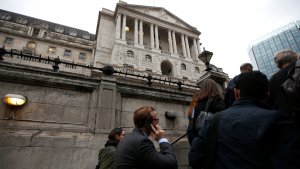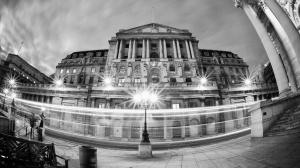The Bank of England said the economy could contract by as much as 3% in the first quarter and another 25% in the three months to the end of June.
Bank Warns Coronavirus Could See Economy Plunge 14% In 2020
The Bank of England said the economy could contract by as much as 3% in the first quarter and another 25% in the three months to the end of June.

The Bank of England has warned coronavirus could see the economy plunge 14% this year in the worst annual fall for more than 300 years.
In its first official outlook on the toll taken on the UK’s finances by the Covid-19 pandemic, the Bank cautioned over a “very sharp” fall in GDP of close to 30% over the first half and a “substantial” hike in unemployment.
It expects gross domestic product (GDP) to fall by around 3% in the first three months of 2020 and then plunge by a further 25% in the second quarter, although it said there was uncertainty over the forecasts.
Britain’s unemployment rate could hit 9% in the second quarter as the lockdown hammers firms across the economy, although with six million people expected to have been furloughed, it said Government schemes will help soften the blow.
The grim forecast came as the Bank held interest rates at the historic low of 0.1% after recent emergency action.
We have published our quarterly #MonetaryPolicyReport alongside an interim #FinancialStabilityReport. Together, they provide a scenario for the path of the UK economy in the light of Covid-19 and assess the financial system’s resilience to that scenario. https://t.co/3FIVG6rG2e pic.twitter.com/434WIhj8JX
— Bank of England (@bankofengland) May 7, 2020
It said the fall should be temporary and that activity should “pick up relatively rapidly” as lockdown is eased, but added that it would “take some time” for the economy to recover.
Its forecasts show, based on an “illustrative” scenario, that the economy could take a year to recover from when the lockdown begins to be lifted.
The Bank is expecting the bounce back in growth to be held back as Britons continue some voluntary social distance measures even after lockdown restrictions are eased.
Its nine-strong Monetary Policy Committee (MPC) voted unanimously to hold rates.
It also kept its quantitative easing (QE) programme to boost the economy unchanged at £645 billion after unleashing another £200 billion of bond-buying in March.
But two members of the MPC voted to increase QE by another £100 billion in a sign that more may be on the way soon.

In a statement, the central bank said: “The spread of Covid-19 and the measures to contain it are having a significant impact on the United Kingdom and many countries around the world.
“Activity has fallen sharply since the beginning of the year and unemployment has risen markedly.”
Rates have already been slashed twice, from 0.75%, since mid-March as part of the Bank’s measures to try and keep the economy afloat during what is expected to be the steepest recession in living memory.
The Bank’s forecasts are slightly more optimistic than the outlook given by the Office for Budget Responsibility (OBR), which warned the economy could shrink by as much as 35% in the second quarter, though this also includes the first quarter impact.
But the Bank’s forecast does paint a worse picture for the recovery, suggesting a V-shaped bounce-back will not come to pass.
It believes growth will almost recover to pre-coronavirus levels over the next two to three years.
In its Financial Stability Report, the Bank assures that UK banks are strong enough to withstand the economic shock and continue supporting households and businesses.
Although it does warn over significant loan losses in the banking sector as consumers and businesses are set to default on loans.
Thanks for signing up to Minutehack alerts.
Brilliant editorials heading your way soon.
Okay, Thanks!

